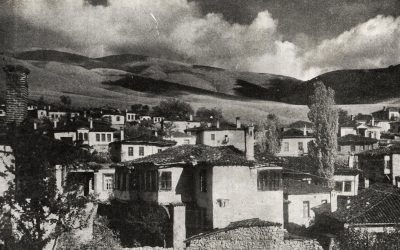By George Zimmar
Greece, a land with a special destiny, Freedom’s home or Glory’s grave
~ Lord Byron
Two hundred years have passed since twenty-year-old Anagnostis Zymaras, my great, great grandfather, joined the company of Kapetan Kostas Katsikas along with other peasants to overthrow the Ottoman tyranny in Peloponnesus. Little did Anagnostis envision that two centuries later the eminent historian of the Balkans, Mark Mazower, would chronicle the revolution that followed, concluding that the independence of Greece had far-reaching effects on nationalist movements throughout Europe.
On or around March 25, 1821, what began as against-the-odds uprisings in several places in Morea (Peloponnesus), and Rumelia to the North, resulted in a coming together of disjointed, poorly armed Greek patriots under the quarreling headship of notable land and ship owners, who often placed the interests of their clan above the goal of a united Greek nation. Dysfunctional leadership cost the revolt its early gains and prolonged the war.
The uprising led to ethnic cleansing of both Muslims and Christians. While seen as a war between Greek versus Turk or Christian versus Muslim, the conflict actually was more complicated. In Rumelia the Greek armatoles (Christian) and Albanian beys (Muslim) found themselves at times at odds with each other and at times in league against a common enemy. Enemies in appearance only and living together in Rumelia made them sometimes forgetful of their duties to nation or religion.
Already by 1823, the two sides seemed locked in a never-ending struggle in which neither side could defeat the other. The Greeks dominated the Morea, but they had failed to drive the Ottomans out of the few remaining fortresses that they held, let alone managed the empire to sue for peace. The Ottomans could mount campaigns on an annual basis, but lacking a regular army or properly commanded navy, they could not reestablish the empire’s authority. Both sides, therefore, began casting about for allies whose contributions might be decisive. (p.213)
Greek tactics were largely hit and run, yet sustained the war effort. In spite of crushing a superior Ottoman force at Aráchova, near Delphi, the Greeks were unable to take Patras and Athens, even supplied by Ottoman materiel and reinforcements. Mazower’s magisterial historical account brings to life the men and women who brought about the emergence of Greece and those Europeans and Americans who assisted in its victory.
When a weak power faces an unquestionably strong power, success of the weaker is unlikely without outside intervention. This was certainly the case of the American colonies against England. France’s assistance and its fleet turned the tide for the Americans. Likewise, the intercession of Europeans served the Greek cause. The Greek revolution became a worldwide liberal cause célèbre, romantic in spirit and reclaiming the glory of ancient Hellas.
Gold from London and loans from France financed the Greek war effort. A motley group of European adventurers assembled to join the Greek cause, with mixed results. Tabloids in European capitals broadcast the enslavement of women and children. Books, letters, papers, periodicals, and speeches in parliaments persuaded influential Europeans of the justice of the Greek cause. Artist Eugène Delacroix depicted the misery of the Chios massacre, Henri Decisisae the fall of Mesolonghi, both of which outraged European elites and provoked the legendary Lord (George Gordon) Byron to join the ranks in Mesolonghi and died tragically, of an illness on its shores.
A surrogate Egyptian army was sent to Peloponnesus under the command of Ibrahim Pasha, who in a sense held the fate of the Ottoman Empire in his hands. His mission was to wreak havoc on its economy, villages, and populace of the Morea. Having destroyed Tripolitsa, Ibrahim happened to encounter some British travelers and described his mission to them:
He would burn and destroy the whole Morea so that it neither be profitable to the Greeks nor to him, nor to anyone, . . . His father Mehmet Ali was training forty thousand men and he was in daily expectation of twelve thousand. If these were cut off, he would have more; and he would persevere till the Greeks returned to their former state. One of the castles on the plain, he said, had been carried by the assault, and the garrison all put to the sword, the other was expected to fall immediately. He repeated: “I will not cease till Morea be a ruin.” (p.298)
Meanwhile the movement for intervention on behalf of the Greeks was gaining momentum among the major powers. The Treaty of London (1827)—signed by Britain, France and Russia and the Greeks but rejected by Constantinople—laid the foundations for an autonomous Greece. The destruction of the Ottoman and Egyptian fleets by a combined British, French and Russian fleet in the Bay of Navarino for all intents put an end to the Ottoman cause in Greece. Ibrahim was forced to remove his troops from the Morea. After several years of negotiations with the Sultan, a treaty was signed, and in 1833 the Bavarian Prince Otto von Wittelsbach was enthroned as King of Greece.
What sets apart Mazower’s magnificent and thoroughly researched history of the Greek Revolution from the many other fine accounts of the war is that it places the conflict in the wider context of the evolving nation state. The successful Greek revolt was a harbinger of a profound transformation of European Society. The uprising of 1821 came after nearly a half- century of revolts, starting with the American colonies, the overthrow of the French monarchy, and Haiti’s bid for freedom. Following Napoleon’s defeat and exile, the scene was set for a breakup of empires and the formation of nation states. Europe was in turmoil, with uprisings in Spain, Sicily, Naples, and Piedmont—which were readily put down. Only the Greek revolt, after a dozen pitiless years of travail and violence, managed to separate the region from the Ottoman Empire and establish a nation state unified in language, religion, and democratic rule.
What followed in the course of the nineteenth century was a unification of other subject peoples—Italians, Poles, and Germans—who saw the success of the Greeks as a promise for their future. Empires and principalities began coming apart, with the Ottoman Empire in the lead. By the mid-twentieth century, nation states rather than empires and monarchies made up the world.
The Treaty of London brought major powers together to mediate a conflict far from their shores, but close to their interests. Today the United States on its own is unable to effect peace in the Ukraine, but the great powers of that day, in unity, were able to bring the conflict between the Ottoman Empire and the rebellious Greeks to a close. However, more conflict was required to end the violence in Morea and Rumelia. A new international system evolved from the deliberations on the Greek War and ways to bring about peace. Mazower suggests that a century later, the founding of the League of Nations—the precursor of the United Nations— served as the basis of conflict resolution among nation states, just as the United Nations does today.
No records list Anagnostis Zymaras in military service in 1828. He had married, and the first of three children, Athanasios, was born that year. A man of substance, Anagnostis was best man at the wedding of Giorgios Kostakis of Tsitalia and Theodora Hontzas on July 1, 1845 in Kosmas, Arcadia. Greece was a nation at peace.
George Zimmar, Archon Prostatis ton Grammaton – Order of St. Andrew the Apostle



